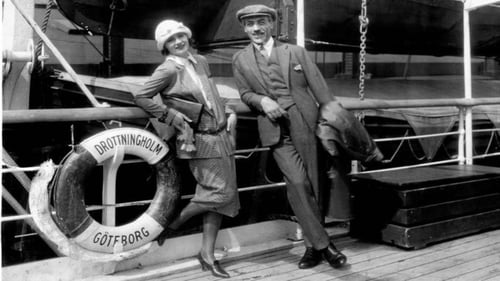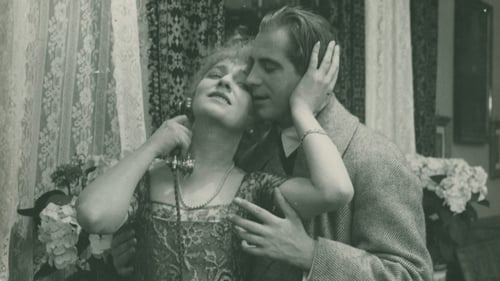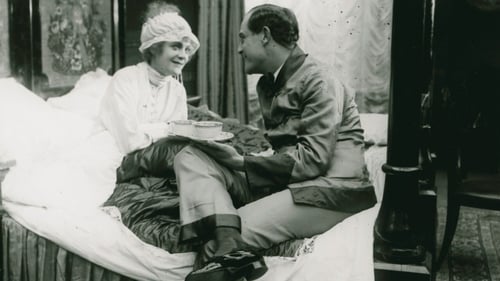
(archive footage)
One day when Ruben Stiller is playing in a bath, he gets an alien talking to Nadja, who asks him to find out the fate of Charly's dog. Ruben agrees because Charly's host was Mauritz Stiller, and Ruben is the grandson of Mauritz's brother.

Mrs. Fagerholm
While Bertil Lindström works at the Swedish embassy in Paris, his wife Gabrielle spends the summer alone in Sweden. After a phone call to her, he starts to think of all the things she can possibly be doing separated from him.

Marthe
Erotikon is a 1920 Swedish romantic comedy film directed by Mauritz Stiller, starring Tora Teje, Karin Molander, Anders de Wahl and Lars Hanson. It is based on the 1917 play A kék róka by Ferenc Herczeg. The story revolves around an entomology professor obsessed with the sexual life of bugs, and his easygoing wife who is courted by two suitors.

Synnöve Solbakken
Synnöve lives with her parents at the farm Solbakken on a sunny hill. Thorbjörn, who lives at Granliden in the shadow of a big mountain, often looks wistfully up to Solbakken. As teenagers they meet and fall in love. Another boy, Knud Nordhaug, is also yearning for Synnöve.

Maggie Frisch
At the Stora Morgonbladet newspaper office the daily work has started, at the same time the journalist Maggie Frisch has just noticed how late she is and what a great position in the paper her article from yesterday has received. She hopes to use the success of her article to lessen the anger of her boss when she gets to the office.

Bessie Douglas
Frau Bessie, once a madcap, aristocratic and modern Swedish fraulein, has become now a whimsical and conservative Swedish burgess after her marriage to Herr Thomas Graal. The destabilization of the marriage begins right at the wedding (which contains some hilarious incidents) when Frau Bessie announces the first Graal child must be a girl, creating a terrible conflict with her husband who is hoping for a boy. It takes a scandal to finally end the war between man and wife.

Hildur
A 1917 Swedish drama film directed by Victor Sjöström, based on a 1913 novel by Selma Lagerlöf. It was the first in a series of successful Lagerlöf adaptions by Sjöström, made possible by a deal between Lagerlöf and A-B Svenska Biografteatern (later AB Svensk Filmindustri) to adapt at least one Lagerlöf novel each year. Lagerlöf had for many years denied any proposal to let her novels be adapted for film, but after seeing Sjöström's Terje Vigen she finally decided to give her allowance.

Bessie Douglas
Thomas Graal's a screenwriter, is very fond of his secretary Bessie. Overtaken by a kiss by Thomas she runs away. In his misfortune Thomas writes a screenplay inspired by Bessie. But she has not been really honest with him. 31 minutes of runtime are missing and presumed lost.

Hertha Weye, journalist
A woman journalist employed as a maid by a great explorer is overcome with remorse at revealing his private life to the public. He shares her feelings and marries her

Emma von Sterner
Hämnaren (The Avenger) was made in 1915, and was rediscovered in Berlin in 2001. It begins with a woman named Ester, who is reading a letter and crying. The letter says that a man named George won't marry her, because he knows his father would never allow him to marry a Jewish woman. Ester dies of childbirth, and possibly a broken heart. Her suitor Jakob takes care of her son, who is named Josef, and sends George a note, accusing him of causing her death

Louise von Volmar
The story is wacky – a gypsy is cursed by her father, so that she has to deny her illegitimate son in order for him to have a successful life. She gives him to a well-to-do lady who has lost her own child. Later, he has grown up to be a politician who wants to become the foreign minister. He doesn’t know that his real mother is the famous Madame de Thebes, the fortuneteller who all politicians make sure to visit! This information falls into the hands of a rival, who tries to use it to ruin his career. Meanwhile, the rival’s attractive daughter is attacked by a ruffian and needs to be rescued… There are a lot of striking images in this film. You can see the beauty of them even if the state of the print is far from perfect. The Norwegian actress Ragna Wettergreen gives a haunting performance as Madame de Thebes, with wisdom and regret – and quite a few melodramatic gestures. Understatement was not the norm in those days.










